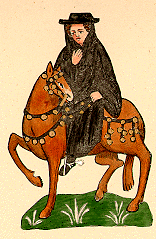

When one thinks of a monk, he may imagine someone who studies, prays, and performs manual labor. The Monk, one of the thirty pilgrims travelling on a pilgrimage to Canterbury in The Canterbury Tales, is nothing like the usual monk many people imagine. He is rebellious, ignores rules, and lives and controls his own life. Chaucer, the narrator and author of The Canterbury Tales, shows these characteristics in the way the Monk looks, the things he says and does, and in the things the host, a character in "The Monk's Prologue," and Chaucer say about him.
The Monk is nothing like the usual monk many people imagine. He hunts hares and rides horses instead of studying, praying, and working. He does not follow the rules of the monastery which say that monks should not hunt, be reckless, nor leave the monastery. Instead,they should study and perform manual labor. The Monk ignores these rules. Chaucer shows that the Monk does not care about the rules when he says, "He yaf nought of that text a pulled hen"(Norton, p.85) and when he says, "Of priking and of hunting for the hare was al his lust, for no cost wolde he spare"(191-192). The Monk will never follow the rules because they are against what he loves to do. He may want to have the title of "monk" but does not want to do what it takes to be a monk, which is to quit riding and hunting and start studying, praying, and performing manual labor. He has control over his life since he does not let the rules dictate what he should or should not do.
The Monk's robe is different from that of other monks. Monks usually wear plain habits with hoods. This Monk has gray fur on the sleeves of his cope and a gold pin with a love knot at the end of the hood. This indicates that he is not religious because instead of the gold pin, he should have a rosary. He is in good shape unlike other monks who are thin because they fast often. He is bald and has a shiny head and face.
He probably did not want to become a monk but decided to be one anyway because the monastery provides a cloistered environment, away from the betrayal of people and of women. In "The Monk's Tale," he talks about different men who died because they were betrayed by their loved ones. Hercules, for example, died after being poisoned by a shirt his girlfriend gave him, and Samson killed himself because his wife gave his secret away to his enemies, who, in turn, tortured him. Since women betrayed these men, the Monk does not trust them.
The host, who appears in "The Monk's Prologue" as well as other Canterbury Tales and in "The General Prologue," notices that the Monk does not belong in the monastery and says, "God confound him, I pray, whoever first led you to take up monastic life, you'd have been a rare cock with the hens" (Wright, p.177). The host also reveals a new characteristic of the Monk when he says, "If you had the freedom, as you have the power, to copulate as much as you desire, a fellow like you would have fathered dozens!" (Wright, p. 177). This indicates that the Monk is lustful. Since monks are not supposed to think about women, he is committing a sin.
Chaucer likes the Monk and seems to agree with his way of life. He says, in "The General Prologue", that the monk is "fair for the maistrye, an outridere...a manly man, to been an abbot worthy" (Norton,p. 85). He probably says this because the Monk has leadership skills since he dictates his life by ignoring the rules of the monastery.
Chaucer shows the Monk's characteristics in the way he looks, the things he says and does, and in the things the host and Chaucer say about him. Chaucer says that the Monk's lust is for riding and hunting while the host says it is for women. The Monk is honest with himself. He is very modern since he ignores the rules of the monastery and wears his robe with gray fur lining at the sleeves. He also seems like he is more of a regular person than a monk.